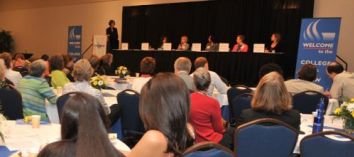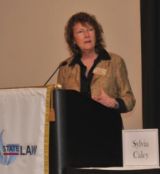College Site | Development | TOC - Department Dev Sites | CLHS TOC | Center for Law, Health & Society | News and Events | Center News | Interdisciplinary Education Conference Interdisciplinary Education Conference
September 24, 2009

In increasing numbers, law schools are forming interdisciplinary partnerships with health-related professional schools, such as medicine, social work, public health, nursing, and mental health, and with health professionals in their communities. This fall the Center for Law, Health & Society and the Health Law Partnership hosted a successful conference entitled, "Interdisciplinary Collaborative Education: Partnerships Between Law Schools and the Health Professions," to explore the opportunities and challenges inherent in these collaborations.
These educational partnerships are located in various settings, including in-house clinics, externship programs, and interdisciplinary classrooms. They all share a common interest in creating experiential learning opportunities. In clinical education settings, these partnerships often show students how combining the expertise of lawyers in a cooperative environment with health care providers can improve the health and well-being of clients.
Colleagues from innovative programs across the country and as far away as Israel gathered to share their perspectives on creating collaborative learning environments. The audience included professionals who engage or plan to engage in interdisciplinary collaborative education, including law school faculty, both clinical and non-clinical; faculty from health-related disciplines; and professionals working in law or health-related fields. 
Three plenary sessions focused on experiential learning in interdisciplinary settings, designing curricula, and addressing issues in ethics and professionalism. Each plenary session was followed by small group breakout sessions for participants to discuss issues raised in the plenary presentation.
Professor Lisa Bliss, a conference organizer, stated, "The small breakout sessions were a wonderful opportunity for participants to engage in focused conversation about their experiences. They were enriched by the diversity of the professions represented, including individuals from law, health care, public health, and social work." Colleagues thinking of creating an interdisciplinary program found it very valuable to hear about "lessons learned" by early adopters.
In addition to the plenary session and small group experiences, three concurrent sessions offered in-depth discussions on teaching advocacy, research and scholarship, and educating health professionals about the law.
Professor Sylvia Caley, a conference organizer, summed up the feedback received on conference evaluations when she said, "Gathering with like-minded professionals committed to nurturing the development of interdisciplinary problem-solving was a motivating experience - one worthy of repeating."